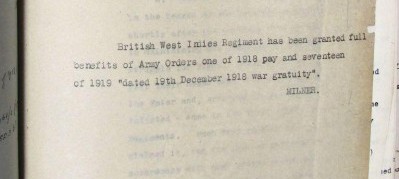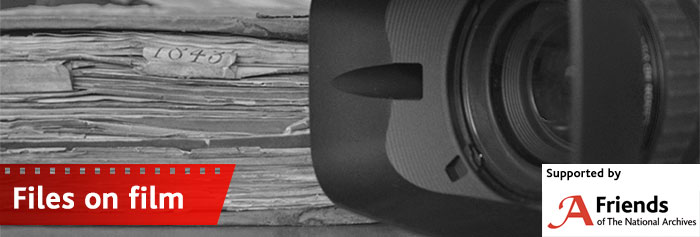Have you ever imagined where Siegfried Sassoon was sitting while writing his poems? Or wondered how nurses dealt with their own experiences of war? Have you thought about what you would ask Mata Hari if you could? Now is your chance to tell that story…
‘Files on film’ is our short film competition where we ask entrants to interpret a selection of documents and draw out the stories they see. This year we have selected documents relating to the First World War as part of our centenary programme. It could be anything from one line in a document that inspires you, to a re-telling of the whole file – the choice is entirely yours.
Some of the files featured have appeared in previous blog posts, for example the service record of Siegfried Sassoon, military appeal tribunal cases and the story of Mata Hari. Last month, my colleague Vicky looked in detail at one of the files in this years selection on Women policing women.
Today I’m going to highlight a document included from our Colonial Office files. I find this one particularly interesting as it really is a hidden voice in swathes of official documents. Although the characters involved appear only as names, the predicament they find themselves in provides food for thought – what were the experiences of those individuals risking their lives, despite being made to feel like second-rate soldiers?
In 1915, the British West Indies Regiment was formed in response to increasing pressure from those wishing to sign up to serve from the Caribbean islands, and the British government’s reluctance to allow black colonial soldiers to fight in existing British regiments. Despite this, many men had already volunteered by travelling to Europe at their own expense, or through sponsorship from charitable organisations. The formation of the British West Indies Regiment finally allowed recognition of the commitment of the island colonies to the war effort. You can find out more about the Caribbean involvement in the First World War through our map, First World War: A global view.
The document included in the ‘Files on film’ selection is a copy of a petition from 1918 by 12 members of the British West Indies Regiment protesting that they were denied a pay increase awarded to other serving soldiers. The men protesting were some of the first to volunteer from Barbados on the promise they would be treated in the same way as other British regiments. They served in the same way as any other soldier and at least one of them, Private J C Hope, received the Distinguished Conduct Medal for his actions. His recommendation read:
‘For conspicuous gallantry and devotion to duty. When wounded in four places, including a broken arm, he displayed the most conspicuous courage and determination in assisting another man, who was also wounded, to return to camp, a distance of over a mile.’ (WO 372/23/57522).
The petition reads:
‘Under military law subject to its various amendments we suffer the full and just penalty when we break that law just as any other British soldier. Yet we are told we are not entitled to the privilege and advantage of the Cadet System, and now, we do not benefit by the increased rate of pay.’
The men also protest at the refusal to grant officer commissions to ‘coloured West Indians’, denying them the opportunity to progress despite undertaking the same duties as white soldiers from the West Indies who it seems could move up.
The petitions are included in correspondence between Barbados and the Colonial Office at the time. The first is accompanied by a covering letter from J Challenor Lynch, chairman of the Recruiting Committee in Barbados, supporting their application and pointing out how early on they volunteered:
‘West Indians were not content to look on when England needed man-power and other parts of the British Empire were making splendid efforts… The first Contingents, the men who first responded to the call were, like their white brothers in England who first responded, some of the best, and the Recruiting Committee feel that the claim of these men to be put on the same footing as other combatant units of the British Army, is a just one.’
The document also includes a later petition at the time of the Taranto Mutiny setting out further grievances in December 1918. After the Armistice a group of 180 black sergeants signed a petition demanding the same pay increase that was given to the rest of the British Army under Army Order 1 of 1918. 49 men from the regiment were found guilty of mutiny.
After both the petitions had been submitted, according to a telegram dated February 1919 from the Secretary of State for the Colonies, members of the British West Indies Regiment from Barbados and other listed Caribbean countries were granted the same increases as other regiments.

The telegram following the petitions confirming the British West Indies Regiment would be entitled to the same pay increases as other regiments. Catalogue reference: CO 28/294/24
This document could be reinterpreted to imagine many different experiences and sides of the story. We’re keen that events such as this are shared with a wider audience, and your short film could help do just that. You can download the full item along with contextual notes from the Files on film pages.
‘Files on film’ is open until midnight on 7 January 2015. You can use anything from a smartphone to a studio to make your film but it must be no more than three minutes long. Prizes sponsored by the Friends of the National Archives will be awarded to first, second and third place.
For more details and to see all the documents in this year’s selection visit our Files on film page.
Good luck!

